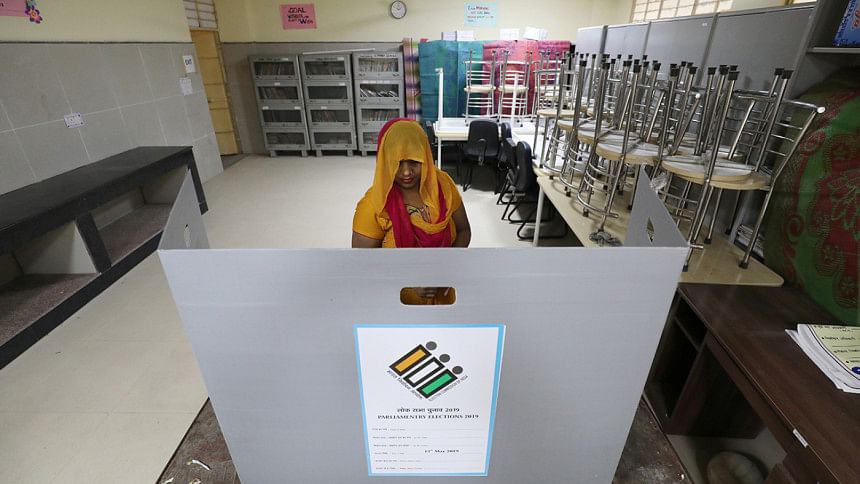Voting in last phase of India polls tomorrow

Voting in the seventh and final phase of India's long-drawn parliamentary elections takes places tomorrow when Prime Minister Narendra Modi-led Bharatiya Janata Party seeks a second consecutive term in power in the face of an unexpectedly tight contest.
Modi himself is among 918 candidates in 59 constituencies spread across seven states and one federally-administered territory where an estimated 10.2 people are eligible to exercise their franchise tomorrow, reports our New Delhi correspondent.
Voters will choose their representatives in Uttar Pradesh (13 seats), West Bengal (9 seats), Punjab (13), Bihar (8), Madhya Pradesh (8), Jharkhand (3), Himachal Pradesh (4) and one federally-administered territory of Chandigarh tomorrow.
The counting of votes will be taken up on May 23 but TV channels will broadcast results of exit polls soon after 6pm Indian time when polling concludes in the seventh phase, reports the New Delhi correspondent.
Ahead of tomorrow's polling, Modi this morning offered prayers at two key Hindu shrines Kedarnath and Badrinath in the Himalayas. Modi is expected to win hands down in Varanasi constituency against his rivals Shalini Yadav of Samajwadi Party-Bahujan Samaj Party alliance and Congress nominee Ajai Rai who had finished a distant third in the previous national poll five years ago. Modi had won by a margin of 370,000 votes against Aam Aadmi Party chief Arvind Kejriwal in 2014.
But in the key battleground state of Uttar Pradesh, where polling will take place in 13 of the total of 80 constituencies on Sunday, Modi's BJP is facing a very tough challenge from SP-BSP combine which, in the absence of a perceptible wave, is banking on caste equations and consolidation of votes of backward Yadav caste, Dalit caste Jatav and Muslims behind them.
The BJP had made a clean sweep in UP in 2014 winning 72 of the 80 seats but this year its tally is likely to be halved, say most poll analysts. The BSP-SP alliance has selected candidates for this year's poll mainly on the basis of social equations, with an eye on the dominant caste factor in the region.
The BJP has mounted efforts in a big way in West Bengal, where voting will be held in nine seats on Sunday, to partially make up for the losses it may suffer in UP and other Hindi-speaking heartland states of Madhya Pradesh, Rajasthan and Chhattisgarh.
The main focus of the last phase of polling will be West Bengal where sporadic violence marred the previous six phases and there are apprehensions of more violence tomorrow.
In an unprecedented action, India's Election Commission curtailed the electioneering time for the final phase in the state by 20 hours following pitched street fighting between supporters of West Bengal's ruling Trinamool Congress and BJP during a road show by BJP chief Amit Shah on Tuesday.
A bust of Bengal Renaissance icon Ishwar Chandra Vidyasagar was vandalized during the violence. The EC's action had come under sharp criticism from Chief Minister Mamata Banerjee and the entire opposition.
The vandalism of Vidyasagar's bust has become an emotive issue in Bengal as the 19th century educationist and social reformer had started widow remarriage and women's education, opened schools and colleges and started the use of Bangla language as a vehicle for literature. The war of words over vandalism of the bust has snowballed into a Bangali versus "outsiders" debate.
The nine constituencies in West Bengal where polling is due on Sunday are Kolkata South, Kolkata North, Dum Dum, Basirhat, Barasat, Diamond Harbour, Jadavpur, Jaynagar (SC) and Mathurapur (SC) where an estimated 1.5 crore voters are eligible to decide the fate of 111 candidates.
The fight in two constituencies would be keenly watched--south Kolkata where Mamata had contested in the past and Diamond Harbour where her nephew Abhishek Banerjee is in the fray.
Polling will also be held tomorrow in all the 13 constituencies of Punjab where ruling Congress party is banking on farmers loan waiver scheme as it faces challenge from Shiromani Akali Dal (SAD), an ally of BJP which is a minor player in the predominantly agrarian state.
Modi tried to change the campaign narrative in Punjab when he, in his poll meetings, raised the issue of 1984 anti-Sikh riots soon after the killing of Indira Gandhi to corner the Congress.

 For all latest news, follow The Daily Star's Google News channel.
For all latest news, follow The Daily Star's Google News channel. 



Comments